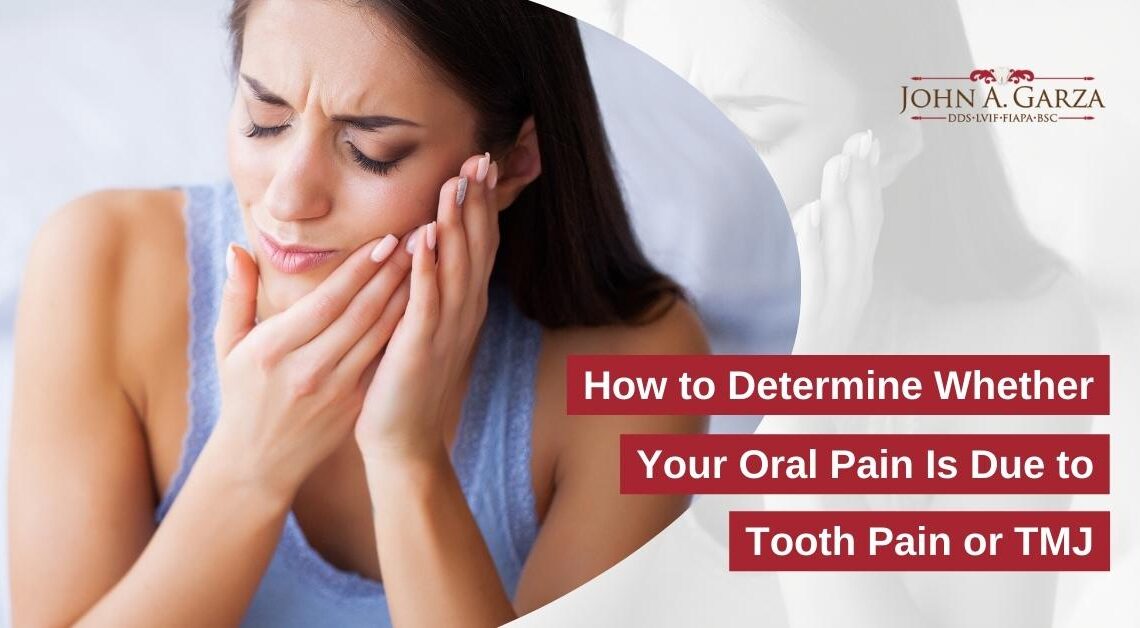A temporomandibular disorder or TMJ symptoms may include pain in the jaw, neck, or face of a patient undergoing dental treatment. Patients themselves can diagnose most dental problems, but TMJ is an exception. Orofacial pain, however, can be a difficult condition to understand. Patients should see a dentist immediately and use caution before purchasing over-the-counter remedies.
In this article, we’ll address the distinction between TMJ and tooth pain.
What is TMJ?
The jawbone and skull are connected by the temporomandibular joints (TMJ). Many of us experience facial pain as a result of temporomandibular joint disorder. TMJ pain is widespread among adults of all ages, despite the fact that it is necessary for chewing, speaking, and smiling.
TMJ issue may be the cause of your jaw pain. It is possible for TMJ difficulties to worsen if you don’t receive adequate treatment.
TMJ problem symptoms include recurring jaw pain, stiffness, and a decreased ability to open and close the mouth. However, symptoms can be more obvious in some cases. TMJ issues can cause facial swelling, so it’s important to keep an eye out for it.
Is It Tooth Pain or TMJ?
Tooth discomfort may result from a dental issue, such as a cavity or gum disease, or a non-dental issue, such as a sinus infection. It’s possible to acquire temporomandibular joint pain due to stress if you’re constantly clenching your jaw and grinding your teeth (TMJ). Open and close your mouth by opening and shutting your TMJ (temporomandibular joint).
A TMJ disorder may also be caused by injuries, traumas, or complex dental procedures.
Disorders of the TMJ and surrounding muscles are known as TMJ disorders. Your jaw muscles are put under additional strain when you clench your jaw and grind your teeth. A person’s ability to speak, chew, swallow, produce facial expressions, and even breathe might be negatively impacted by TMJ issues.
Nonetheless, as a result of its location and the responsibilities it holds, TMJ pain is sometimes mistaken for dental pain.
Consult a Professional
Finding the source of the problem is the first step in treating it, and your dentist may often assist with this process. Dentists are able to help you strengthen your jaw muscles by showing you how to do specific exercises. Muscle relaxants, analgesics, and anti-inflammatory medicines may also be prescribed by your dentist based on your pain level.
Correcting a dental problem, such as root canal therapy or braces, maybe all that is needed to alleviate your pain and restore your oral health. Due to your dental condition, you may still be experiencing TMJ pain even after you have become acclimated to grinding your teeth.
Fortunately, your dentist can equip you with a bite plate or night guard if you do grind your teeth at night. There is no way to stop you from clenching your teeth completely, but they can assist reduce the frequency with which you do so. Further treatment includes splint therapy, physical therapy for the jaw and neck muscles, short-term muscle relaxers or analgesics, or injections of Botox® to help alleviate muscle contractions.
Eliminate Tooth-Related Causes
Your dentist is probably aware of these possibilities, but it’s still necessary to check your teeth for anything that might be causing your tooth discomfort.
The most common cause of tooth pain is a cavity. In order to be sure that you do not have any cavities in the impacted teeth, you should acquire a second opinion before you assume you don’t have any. Having a filling in a tooth does not guarantee that you will not develop a cavity later on. Old fillings have a tendency to develop cavities. Old dental crowns might harbor cavities.
You may be experiencing discomfort in your teeth because of old amalgam fillings, which can exacerbate the sensitivity and pain of your teeth. Fillings and crowns can sometimes cause pain by interfering with your biting.
In addition to toothaches, gum disease and receding gums can also be to blame. There is a risk of exposing the tooth’s sensitive root.
It can also be painful to have a tooth that has been fractured or chipped. It’s possible that the discomfort is ongoing or that it comes and goes.
When you have discomfort in your teeth, it’s possible that your jaw is tense.
How Jaw Tension Can Cause Tooth Pain
There is a connection between TMJ pain and toothaches, but it goes much deeper. Crowns, for example, can alter your bite if you have a lot of dental work done. Because of this, the jaw joint is put under additional stress. The jaw joint is inflamed and irritated by the altered posture of the mouth, unlike referred pain. This can lead to long-term TMJ pain if left untreated.
To make matters worse, the jaw joint might be affected by an upper molar toothache, leading to the perception of TMJ pain. If the toothache can be relieved, the TMJ pain should go away as well. The pain may have prompted you to grind your teeth or clench your teeth, which may have left the TMJ painful for a while as well.
Consult with Garza DDS to learn more about TMJ swelling
In the case that your tooth pain is caused by TMD, treating the disorder itself should provide long-term pain relief. If you’re experiencing jaw pain, clicking, or popping when you eat or speak, it’s time to consult with a professional. At Garza DDS, we specialize in diagnosing and treating TMJ tooth pain and can help you find relief from your symptoms. We understand how debilitating jaw pain can be, and we want to help you find relief. Contact us today to schedule an appointment and start on the path to better health.


